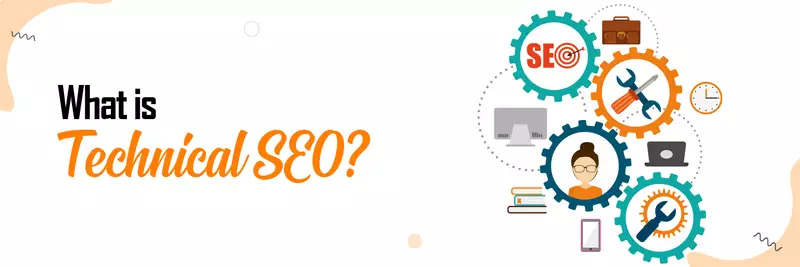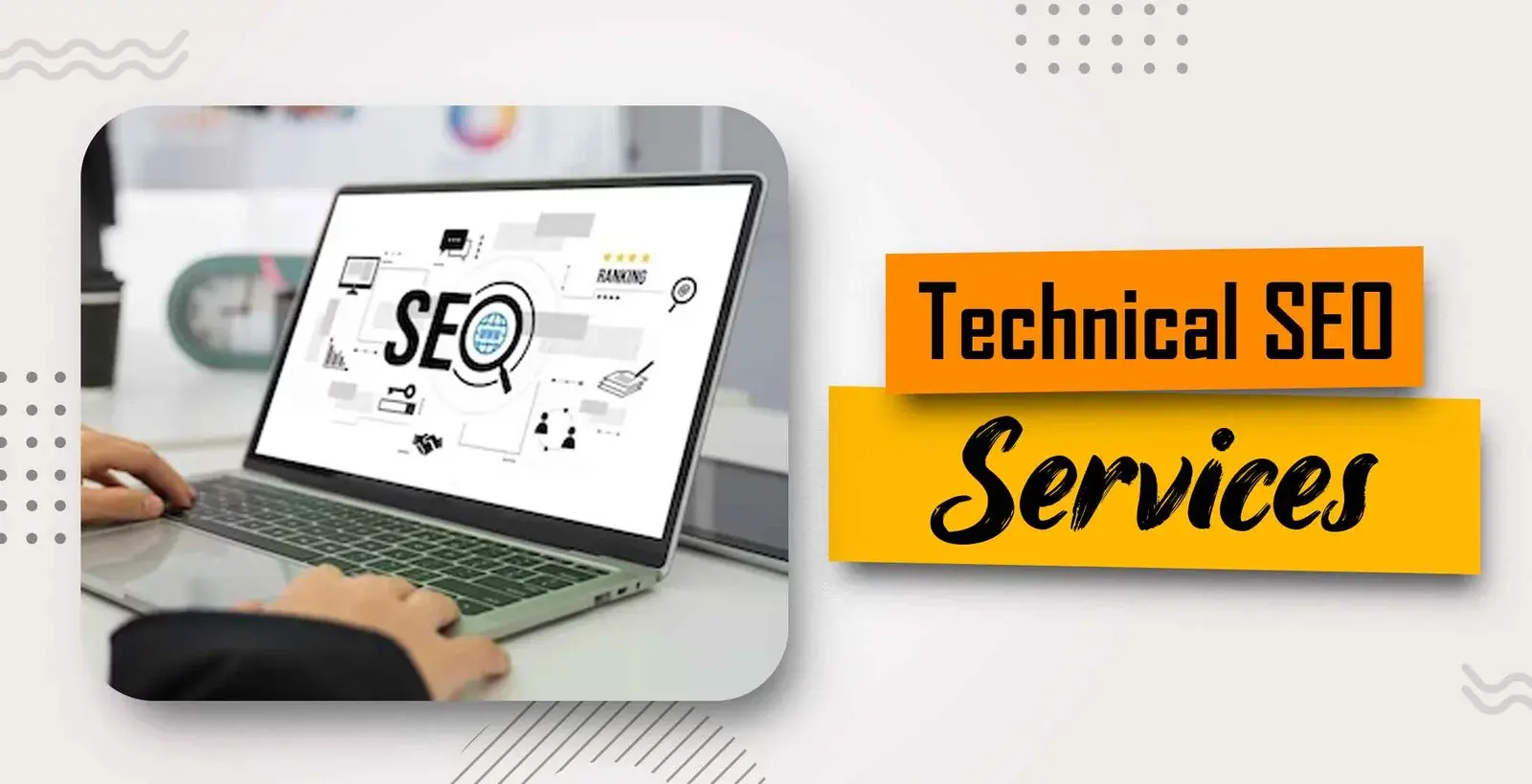The Roadmap to SEO Success: Navigating the World of Technical SEO
In today’s digital landscape, achieving online visibility and success is intricately tied to effective Search Engine Optimization (SEO). Among the various facets of SEO, Technical SEO Services are pivotal in optimizing a website’s infrastructure for search engines.
This roadmap will guide you through the complex and ever-evolving world of Technical SEO, shedding light on essential strategies, best practices, and the latest trends. By understanding the intricacies of Technical SEO, you’ll be well-equipped to enhance your website’s performance, improve its search engine rankings, and ultimately, drive organic traffic and success. Let’s embark on a journey of discovery and mastery in Technical SEO.
What is Technical SEO?

Technical SEO services refer to the specialized activities and strategies aimed at improving the technical aspects of a website to enhance its search engine visibility and overall performance. These services are typically provided by SEO (Search Engine Optimization) experts or agencies with a focus on the technical aspects of a website rather than its content or off-site factors.
Some key aspects of technical SEO services include:
1. Website Speed Optimization
Ensuring that web pages load quickly and efficiently, can improve user experience and search engine rankings.
2. Mobile Optimization:
Make sure a website is mobile-friendly and responsive, as mobile-friendliness is a significant ranking factor for search engines like Google.
3. Crawlability and Indexability
Ensuring that search engines can easily crawl and index the website’s pages, which involves optimizing the website’s structure, navigation, and XML sitemaps.
4. Site Architecture
Organizing the site’s content logically and hierarchically to improve both user experience and search engine indexing.
5. URL Structure
Optimizing URL structures for both users and search engines, including using descriptive and keyword-rich URLs.
6. Canonicalization
Implementing canonical tags to prevent duplicate content issues and consolidate ranking signals.
7. Schema Markup
Adding structured data markup to web pages provides search engines with additional information about the content, which can lead to rich snippets in search results.
8. Website Security
Ensuring the website is secure using HTTPS and taking measures to protect against security vulnerabilities.
9. XML Sitemaps
Creating and maintaining XML sitemaps to help search engines discover and index new pages on the website.
10. Redirect Management
Managing redirects properly to avoid broken links, and ensuring that search engines understand the relationship between old and new URLs during website changes or redesigns.
11. Pagination and Parameter Handling:
Dealing with issues related to paginated content and URL parameters, which can affect search engine indexing and user experience.
12. Server and Hosting Optimization:
Ensuring that the website’s server and hosting infrastructure are reliable, secure, and provide good performance.
What are the Important Components of Our Technical SEO Services?

Important components of technical SEO services typically include:
1. Website Audit
This involves a comprehensive analysis of your website to identify technical issues, such as broken links, duplicate content, and indexing problems. It helps in understanding the current state of your website’s SEO.
2. On-Page SEO Optimization
This includes optimizing individual web pages to improve search engine rankings. It involves optimizing meta tags, headers, and content to make them more search engine-friendly.
3. Site Speed Optimization
Improving website load times is crucial for both user experience and SEO. This may involve optimizing images, minifying code, and implementing content delivery networks (CDNs).
4. Mobile Optimization
Ensuring your website is mobile-friendly is essential, as Google considers mobile-friendliness a ranking factor. This may involve implementing a responsive design or creating a mobile version of your site.
5. Schema Markup
Adding structured data markup to your website can enhance the visibility of your content in search results, making it more appealing to users.
6. XML Sitemap and Robots.txt
Creating and optimizing XML sitemaps and robots.txt files to help search engines crawl and index your site more effectively.
7. Canonicalization
Properly handling canonical tags to prevent duplicate content issues.
8. URL Structure Optimization
Creating clean, user-friendly URLs that contain relevant keywords and are easy to understand.
9. HTTPS/SSL Implementation
Google has indicated that secure websites (using HTTPS) may receive a slight ranking boost.
10. International SEO (if applicable)
Implementing hreflang tags to indicate language and regional targeting for international websites.
11. Technical Error Resolution
Identifying and fixing issues like 404 errors, 301/302 redirects, and other technical errors that can impact user experience and SEO.
12. SEO-Friendly Structured Data
Implementing structured data to enhance the appearance of your content in search results, such as rich snippets.
13. Crawl Budget Optimization
Managing how search engine crawlers prioritize and navigate your website to ensure they focus on the most important pages.
14. AMP (Accelerated Mobile Pages)
Implementing AMP for faster loading times on mobile devices.
15. SEO Reporting and Monitoring
Providing regular reports and analysis of your website’s performance in search engine rankings and traffic.
Why Partner with a Technical SEO Agency?

Partnering with a technical SEO agency can be a strategic decision for businesses looking to improve their online presence and drive more organic website traffic. Here are some reasons why you might want to consider partnering with a technical SEO agency:
1. Expertise and Specialization
Technical SEO agencies specialize in search engine optimization, particularly the technical aspects of it. They have in-depth knowledge and expertise in website architecture, site speed optimization, mobile optimization, and more. This specialized knowledge can help your website perform better in search engine rankings.
2. Staying Updated with SEO Trends
SEO is a rapidly evolving field with search engine algorithms constantly changing. Technical SEO agencies stay updated with the latest SEO trends and best practices, ensuring your website adheres to the most current SEO guidelines.
3. Improved Website Performance
Technical SEO agencies can identify and resolve issues that may be hindering your website’s performance in search engines. This can include fixing broken links, optimizing page load times, and improving mobile-friendliness, all of which can lead to better user experiences and higher search rankings.
4. Customized SEO Strategy
A technical SEO agency can tailor an SEO strategy to your specific business needs and goals. They can conduct a thorough website audit to identify areas for improvement and create a customized plan to address those issues.
5. Competitive Advantage
By partnering with a technical SEO agency, you can gain a competitive edge. Optimizing the technical aspects of your website can help you rank higher in search results, attracting more organic traffic and potential customers.
6. Focus on Core Business Activities
Outsourcing your technical SEO needs to an agency allows you to focus on your core business activities. It frees up your time and resources, enabling you to concentrate on what you do best while the agency handles the technical SEO work.
7. Data-Driven Results
Technical SEO agencies use data and analytics to measure the impact of their strategies. They can provide you with detailed reports and insights on the performance of your website, helping you make informed decisions.
Technical SEO Services for Local Businesses

1. Website Audit
Conduct a comprehensive audit of the local business website to identify technical issues.
2. On-Page Optimization
Optimize on-page elements like title tags, meta descriptions, header tags, and content for local relevance and keywords.
3. Keyword Research
Perform keyword research to target local search terms that potential customers use.
4. Citation Cleanup
Ensure consistent NAP (Name, Address, Phone number) across online directories and listings.
5. Google My Business (GMB) Optimization
Optimize the GMB profile with accurate business information, photos, and regular updates.
6. Schema Markup
Implement schema markup to help search engines understand local business information.
7. Local Link Building
Acquire high-quality local backlinks to boost local search visibility.
8. Mobile Optimization
Ensure the website is mobile-friendly, as mobile search is crucial for local businesses.
9. Page Speed Optimization
Improve website loading speed for a better user experience and search engine ranking.
10. SSL Certificate
Secure the website with an SSL certificate to build trust with users and search engines.
11. Local SEO Tracking
Monitor local keyword rankings and website performance.
12. Technical SEO Fixes
Address issues like broken links, duplicate content, and crawl errors to enhance website health.
13. Local Reviews Management
Encourage and manage customer reviews on platforms like Google, Yelp, and Facebook.
14. Local SEO Reporting
Provide regular reports to track the effectiveness of SEO efforts.
15. Competitor Analysis
Analyze the local SEO strategies of competitors to identify opportunities and gaps.
16. Voice Search Optimization
Adapt SEO strategies for voice search, which is becoming increasingly important for local queries.
17. Google Maps Integration
Optimize local map search results to improve visibility on Google Maps.
18. Structured Data Markup
Implement structured data to enhance search results with rich snippets.
19. Local SEO Content Creation
Create locally relevant content to engage and inform the target audience.
20. Technical Support
Offer ongoing technical support and updates to maintain and improve local SEO performance.
Create Actionable SEO Strategies for A Winning Online Campaign

Creating a winning online SEO campaign requires a combination of both on-page and off-page strategies to improve your website’s visibility in search engines. Below are actionable SEO strategies to help you achieve better rankings and attract more organic traffic to your website.
1. Keyword Research and Optimization
- Start by conducting thorough keyword research using tools like Google Keyword Planner, SEMrush, or Ahrefs.
- Identify relevant keywords and phrases related to your business, products, or services.
- Optimize your website’s content, including titles, headings, meta descriptions, and body text, with these keywords. Ensure natural integration without keyword stuffing.
2. Technical SEO
- Improve your website’s technical aspects, like page load speed, mobile-friendliness, and site structure. Tools like Google PageSpeed Insights can help you identify issues.
- Implement a responsive design to ensure your website functions well on all devices.
- Use an XML sitemap to help search engines index your site’s pages effectively.
3. On-Page SEO
- Create high-quality, informative, and engaging content that caters to the needs of your target audience.
- Include internal links to other relevant pages on your website to improve navigation and keep users engaged.
- Optimize images with descriptive alt text and reduce their file sizes for faster loading times.
4. Link Building
- Develop a link-building strategy to earn high-quality backlinks from reputable websites in your industry.
- Guest posting, content marketing, and outreach to industry influencers can help you secure backlinks.
- Monitor and disavow toxic backlinks that may harm your website’s ranking.
5. Local SEO (if applicable)
- If you have a local business, optimize for local SEO by claiming and updating your Google My Business listing.
- Encourage customer reviews and respond to them promptly.
- Ensure that your business information (NAP – Name, Address, Phone number) is consistent across all online directories.
6. Content Marketing
- Develop a content calendar and consistently produce high-quality, informative, and shareable content.
- Promote your content on social media platforms and email newsletters to increase visibility.
- Encourage user-generated content, such as reviews, testimonials, and comments.
7. User Experience (UX)
- Enhance the user experience on your website by ensuring it’s easy to navigate and visually appealing.
- Optimize for mobile devices and improve page loading times.
- Create clear call-to-action buttons to guide users toward your conversion goals.
8. Analytics and Monitoring
- Regularly track your SEO efforts with tools like Google Analytics, Google Search Console, and other SEO software.
- Monitor your website’s organic traffic, rankings, and user behavior to identify improvement areas.
- Adjust your strategy based on the data you collect.
9. Competitor Analysis
- Analyze your competitors’ websites to identify opportunities and gaps in your SEO strategy.
- Understand their keyword targeting, content strategies, and backlink profiles.
- Use this information to refine your SEO tactics.
10. Page Speed Optimization
- Implement page speed optimization techniques, such as image compression, browser caching, and minification of CSS and JavaScript files.
- Use a content delivery network (CDN) to reduce loading times for users across the globe.
What Technical Services Can I Expect from First Page Strategy?

1. Website Audit
A comprehensive analysis of your website’s technical aspects to identify issues and areas for improvement.
2. On-Page Optimization
Optimizing individual web pages for search engines, including keyword optimization, meta tags, header tags, and content optimization.
3. Site Speed Optimization
Improving the loading speed of your website is a crucial ranking factor and contributes to a better user experience.
4. Mobile-Friendly Optimization
Ensuring that your website is responsive and mobile-friendly, as mobile-friendliness is important for both SEO and user experience.
5. Technical SEO Fixes
Addressing issues such as broken links, crawl errors, duplicate content, and other technical problems that may hinder search engine indexing and ranking.
6. XML Sitemaps
Creating and optimizing XML sitemaps to help search engines better understand the structure of your website.
7. Robots.txt
Configuring the robots.txt file to control which parts of your website search engines can and cannot crawl.
8. Canonicalization
Implementing canonical tags to avoid duplicate content issues and ensure that search engines index the correct version of a page.
9. Schema Markup
Adding structured data to your website to enhance search engine visibility and provide more informative search results.
10. SSL Certificate Implementation
Ensuring that your website uses HTTPS for secure data transmission, which can impact search engine rankings and user trust.
11. URL Structure Optimization
Creating clean and user-friendly URLs optimized for search engines.
12. Image Optimization
Compressing and optimizing images to reduce page load times and improve user experience.
13. Technical SEO Reporting
Providing regular reports on the performance of your website and the impact of technical SEO efforts on search engine rankings.
14. SEO Consultation and Recommendations
Offering expert advice on SEO strategies and changes to improve your website’s technical performance.
Why Choose First Page Strategy?

1. Increased Visibility
Achieving a first-page ranking in search engine results (e.g., Google) can significantly increase your website’s visibility to potential customers. Most users tend to click on results that appear on the first page of search engine results pages (SERPs).
2. Click-Through Rates (CTR)
Websites that rank higher on the first page often receive more clicks and traffic, resulting in higher CTR. This can lead to more leads, conversions, and sales.
3. Enhanced Credibility
Ranking on the first page of search results can give your website added credibility and trustworthiness in users’ eyes. People often associate top-ranking websites with authority and expertise in their respective fields.
4. Targeted Traffic
A first-page strategy can help you attract more targeted and relevant traffic to your website. This means reaching people actively searching for products or services related to your business.
5. Competitive Advantage
Outranking your competitors on the first page can give you a competitive advantage in your industry. It allows you to capture market share and potentially steal traffic from your competitors.
6. Cost-Effective Marketing
Organic search engine optimization (SEO) efforts that lead to first-page rankings can be cost-effective compared to other digital marketing strategies like pay-per-click advertising.
7. Long-Term Benefits
Once you achieve a first-page ranking, maintaining it can provide a consistent source of organic traffic over time. This can lead to a steady stream of potential customers without the ongoing costs of paid advertising.
8. Better User Experience
Websites that are optimized for search engines often provide a better user experience, with faster loading times, well-structured content, and mobile-friendliness. This can lead to higher user satisfaction and engagement.
9. Geographic Targeting
Local businesses can benefit from first-page rankings in local search results, which can help them attract nearby customers.
10. Measurable Results
You can track the performance of your first-page strategy through various SEO analytics tools, allowing you to make data-driven decisions to improve your online presence.
Why choose Offshore Marketers as a Technical SEO Agency?

There are many reasons why you might choose an offshore marketer as a technical SEO agency:
1. Cost-effectiveness
Offshore marketers are often much more affordable than their domestic counterparts. This is because the cost of living in many offshore countries is lower, which means that offshore marketers can charge lower rates without sacrificing quality.
2. Expertise
Offshore marketers often have a deep understanding of technical SEO, as they have to be able to compete with domestic marketers in a global market. They also have access to a wider range of resources and tools, which can help them deliver better results for their clients.
3. Focus
Offshore marketers can be a great option for businesses that want to focus on their core competencies. By outsourcing their technical SEO needs to an offshore agency, businesses can free up their time and resources to focus on other aspects of their business.
4. Flexibility
Offshore marketers are often more flexible than domestic marketers. They are often willing to work around your time zone and schedule, and they can be more accommodating of your specific needs.
If you are considering outsourcing your technical SEO needs to an offshore agency, there are a few things you should keep in mind.
5. Please do your research
Make sure to research the agency thoroughly before you hire them. Read reviews from other clients and ensure they have a good track record of success.
6. Set clear expectations
Be clear about your expectations with the agency from the start. What are your goals for your technical SEO campaign? What kind of results do you expect to see?
7. Communicate regularly
Communicate regularly with the agency throughout the campaign. This will help to ensure that they are on track to meet your expectations and that you are happy with the results.
Overall, there are many benefits to choosing an offshore marketer as a technical SEO agency. Offshore marketers can be more affordable, more expert, more focused, and more flexible than their domestic counterparts. However, it is important to do your research, set clear expectations, and communicate regularly with the agency to ensure you are happy with the results.

